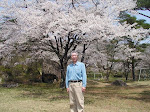
On September 4, Dr. Gabi Greve sent us a comment on 'Basho's stay in Kisakata, Akita (Part 1), saying "lately I enjoy Basho and the Sake no Hosomichi. And I wonder what Basho might have eaten at Kisakata."
I answered her question, writing my haiku and tanka on the Akita International Haiku Network today. Please look at our site: http://akitahaiku.wordpress.com/.
Here I'd like to show you my haiku and tanka.
生牡蠣や伏流水の洗ひかな
(nama gaki ya fukuryusui no arai kana)
Fresh oyster ―
being washed by
undercurrent water
雨水はブナの根に伏し流れ出す海辺に着きて牡蠣を洗えり
(amamizu wa buna no ne ni fushi nagaredasu umibe ni tsukite kaki wo araeri)
Rainwater collects under the roots of beech trees
and then streams
reaching the shore and washing oyster
― Hidenori Hiruta

At least I know what Basho was eating coming out of the Dewa mountains ...
返信削除めずらしや山を出羽の初なすび
mezurashi ya yama o Dewa no hatsu nasubi
how wonderful and extraordinary !
coming out of the sacred Dewa mountains
to these first eggplants
"After we confined ourself in Haguro-Sanzan Shrine to pray for seven days,we have come down to Tsuruoka Town. Then we are given a warm welcome at Nagayama Juko's residence. How delicious the new egg plants are at the dinner."
Matsuo Basho at Sakata
http://washokufood.blogspot.com/2008/05/dadacha-mame-yamagata.html
.
Gabi san
返信削除Thank you very much for your comment.
You're really familiar with the Japanese cultures.
I wish I could eat those new delicious eggplants as Basho and his companion did.
Thank you again. Hidenori Hiruta